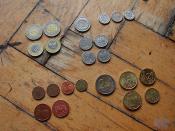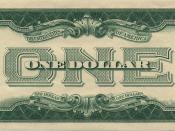Over the last 12-month period ending July 2003, the U.S. Dollar has slid approximately 15% in international value against the Euro (Reuters Investor).
Now that the Iraq war is supposedly over, the market value of the U.S. Dollar in comparison to the Euro throughout the last half of 2003 may solidify the Euro's dominance over the U.S. Dollar in the international investment community.
The United States dollar's continued devaluation against the Euro and may continue for some time. However, as consumer confidence increases, like it has over the recent quarter, it may help to turn this decline around for the US Dollar (Martens). Federal Reserve Chairperson Alan Greenspan in a March 2002 speech pointed out that as foreign investment in the US has been increasing since the mid 1990s, investors will become wary about the soaring deficits in the balance of payments. Simply put, as foreign companies were fueling the U.S.
capital stock market over the past few years, the U.S. is now sending more interest payments and dividends abroad and becoming increasingly dependent on external money. In addition, more international financial transactions, previously monopolized by the U.S. Dollar currency, are now being made in the Euro. A true concern that the U.S. may have, with its long-standing romance with oil, is that OPEC and the international oil selling community will follow this lead and also switch to the Euro (Clark). For example, not counting in the skeptical British, the Japanese, Chinese and other overseas investors may very well decide in the future that they prefer to deal in the Euro which would contribute to a shift in preferred currency for oil and raw materials (Martens).
One certain advantage to a strengthening Euro is that it allows for U.S. goods to be exported at more favorable prices to those countries using the Euro. In this way, perhaps the U.S. can begin to climb out of its economic slump by selling exports at more competitive prices to Euro wielding countries. Likewise, some U.S. companies are beginning to dump European subsidiaries in order to both downsize and avoid expensive European inputs in order to take advantage of falling prices in the U.S.
While the U.S. has certainly seen large external debts before, the annual deficit of the balance of payments is now approximately 5% of its GDP (Martens). This is, in part, a result of interest rates in the U.S. being at nearly an all time low, which is providing little incentive for foreign entities to invest capital in the U.S. This, as Greenspan noted, reduces opportunity to increase productivity, create domestic jobs and reduce the current account balance (HSBC).
The Bush Administration's fiscal policy certainly does not seem to address any of the above issues as it still seems to be focused on increasing consumer spending (Bases). This, in example, directly conflicts with Greenspan's opinion that increased domestic savings would help provide much needed capital in the U.S. necessary to make up for decreased investments in the U.S. by foreign companies (David).
So, it remains to be seen whether or not the Euro will be dropped in favor of the U.S. Dollar, but in the meantime, foreign imports have become increasingly expensive over the last year, forcing consumers to buy more domestic goods, which in turn contributes to the increased consumer spending that has happened sporadically over the past three months. The performance of the Euro will be hard for the U.S. Dollar to bring down. I, for one, am not convinced this is merely a temporary position for the U.S: Dollar.
Sources:Clark, William. "Review: Dollar vs. Euro War" http://www.offnews.info/inteligencia_seguridad/dollar_euro.htmDavid, Javier. "FOREX-Euro pares losses, still eyes 3-1/2 month low", 19 August 19, 2003. www.reuters.comMartens, Hans. European Policy Centre, 5 May 2003 http://www.theepc.net/challenge/dossiersdetail.asp?DOSS=The%20EuroBases, Daniel. "Consumer Sentiment Falls Unexpectedly", 19 August 2003. www.reuters.comHSBC Currency Weekly, 13 July 2003, http://www.ameinfo.com/news/Detailed/26118.html





